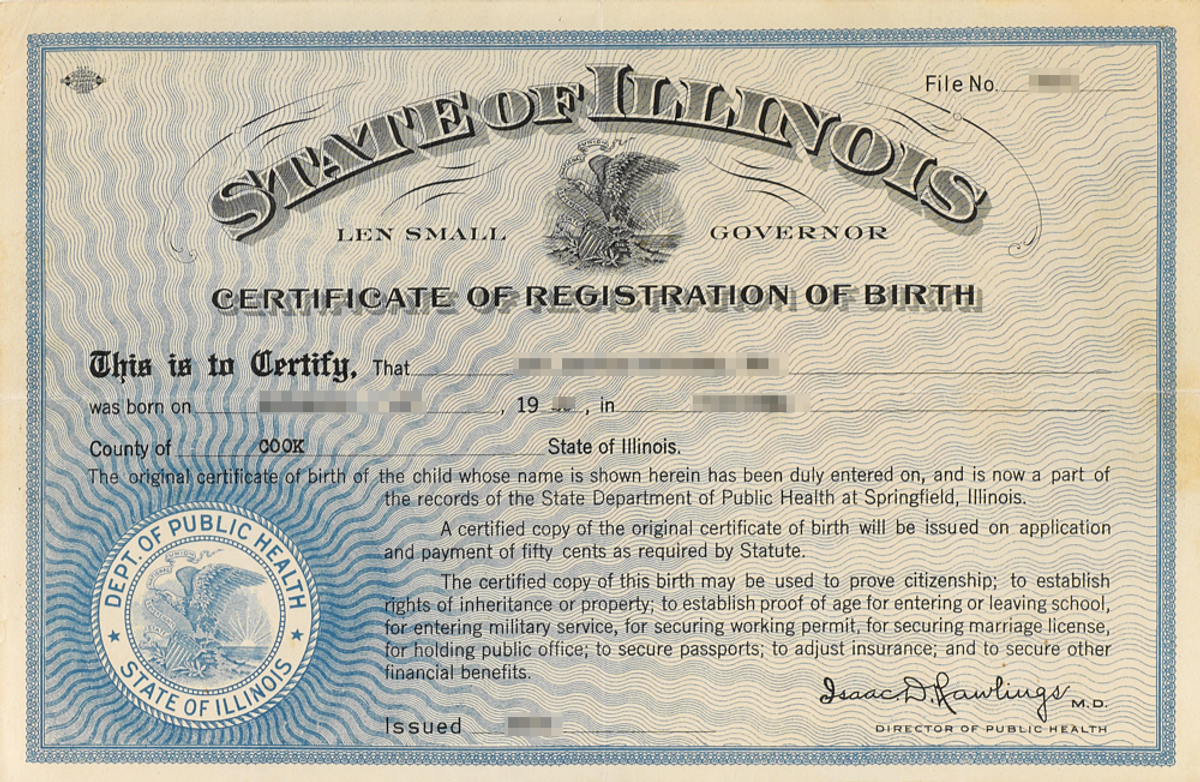HB6064 was introduced as a change to Illinois' public aid laws and contained provisions that could prevent a single mother from obtaining a birth certificate if she didn't identify the father of her child.
The bill did not prevent all single mothers from obtaining birth certificates, nor was it intended to punish or stigmatize single mothers by preventing them from obtaining birth certificates
On 20 February 2016, Chicagoist published an item about a newly proposed bill in the state of Illinois that could, if passed, make obtaining a birth certificate more difficult for single mothers:
If a father is not listed on a birth certificate to a newborn child, the bill says a birth certificate would not be issued for that child and any hopes of receiving financial assistance, if needed, would be dashed. The bill does this by amending the Vital Records Act. You may be shocked to hear that HB6064, filed last week, is being sponsored by two white Republican men: Rep. John D. Cavaletto of Salem (which is a couple hours outside St. Louis), and Keith Wheeler, who represents the western 'burbs.
Here's a snippet from the proposed legislation:
“Provides that if the unmarried mother cannot or refuses to name the child's father, either a father must be conclusively established by DNA evidence or, within 30 days after birth, another family member who will financially provide for the child must be named, in court, on the birth certificate. Provides that absent DNA evidence or a family member's name, a birth certificate will not be issued and the mother will be ineligible for financial aid from the State for support of the child.”
On 24 February 2016, two blog posts about the bill led many to believe that Illinois Republicans proposed to simply refuse to issue birth certificates to unmarried women, no matter what their circumstances.
The bill in question was HB6064, introduced on 11 February 2016. Many readers inferred that the bill's intent was morally punitive, put forth simply to stigmatize unmarried mothers. However, its synopsis introduced it as part of Illinois' "Public Aid Code," which contained rules and laws about the distribution of state assistance to families in need:
Public purpose-Aims in providing financial aid and services. The purpose of this Code is to assist in the alleviation and prevention of poverty and thereby to protect and promote the health and welfare of all the people of this State ... To accomplish this purpose, this Code authorizes financial aid and social welfare services for persons in need thereof by reason of unemployment, illness, or other cause depriving them of the means of a livelihood compatible with health and well-being, and provides for the development, use and coordination of all resources in this State, governmental and private.
HB6064's introductory paragraph provided context for the bill's purpose. Lawmakers proposing the changes were seeking to amend public assistance laws, not pass legal judgement on single mothers or "illegitimate" children. Its synopsis detailed lawmaker objectives in passing such a bill, namely cutting tax spending on support for children with living, able-bodied fathers:
Amends the Vital Records Act. Removes a provision concerning use of the biological father's name on the birth certificate if not married to the biological mother. Provides that if the unmarried mother cannot or refuses to name the child's father, either a father must be conclusively established by DNA evidence or, within 30 days after birth, another family member who will financially provide for the child must be named, in court, on the birth certificate. Provides that absent DNA evidence or a family member's name, a birth certificate will not be issued and the mother will be ineligible for financial aid from the State for support of the child. Provides an exception for artificially inseminated mothers. Amends the Illinois Public Aid Code. Provides that a family that does not comply with the Vital Records Act provision concerning birth certificates of unmarried mothers shall be ineligible for aid for support of the child. Effective immediately.
Proposed changes were underlined at the bottom of the page, detailing the changes announced in the bill's synopsis:
(10) If an unmarried mother cannot or refuses to name the
24 child's father at the time of birth, either:
25 (a) a father must be conclusively established by DNA
26 evidence; or
1 (b) within 30 days after birth, another family member
2 who will financially provide for the child must be named,
3 in court, on the birth certificate.
4 If neither condition is met, a birth certificate shall not
5 be issued for the child and the mother will be ineligible for
6 any financial aid provided under the Illinois Public Aid Code
7 for the support of the child.
8 However, if an artificially inseminated mother wishes to
9 raise the child on her own, she may obtain a birth certificate
10 for the child with only her name on the birth certificate if
11 she signs a release stating that she waives her rights to any
12 financial aid provided under the Illinois Public Aid Code for
13 the support of the child.
It was true that Reps. John D. Cavaletto and Keith Wheeler proposed a bill on 11 February 2016 that, if passed, would inhibit the acquisition of a birth certificate for some single mothers. However, that proposal's primary target appeared to be scenarios in which a child's father could be named on a birth certificate (and thus be liable for providing support) but wasn't, placing the fiscal burden of care for a child onto taxpayers.
While the onus was placed on the child's mother to comply in naming the father and completing that record (which would, arguably, make life extremely difficult for single mothers unwilling or unable to comply for a variety of reasons) the bill's goal appeared to be ensuring that fathers of babies born to single mothers paid support for their offspring rather than allowing the state to pick up the tab.

